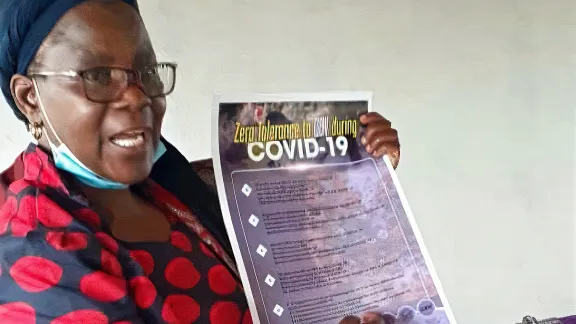
The Rev. Elitha Moyo displays a COVID-19 best practices and gender-based violence prevention poster in the Mberengwa Ward 23 area, a border community in Zimbabwe at increased risk for both. Photo: ELCZ
Border town vulnerable to virus spread, rise in violence against women
(LWI) - Concerned that the Coronavirus disease (COVID-19) pandemic is going unchecked among unauthorized border crossings, the Evangelical Lutheran Church in Zimbabwe (ELCZ) expanded its COVID-19 awareness campaign and gender-based violence (GBV) prevention efforts to a border community.
Encouraging people to prevent the spread of the virus with best practices and remain vigilant against violence toward women, the ELCZ collaborated with a team of counselors, a member of the Zimbabwe Parliament and local chiefs of Gurungweni village in the southeastern province of Masvingo.
The recent border closures between the three countries due to the pandemic means that unauthorized crossings are happening “without proper COVID-19 screening or quarantine,” said Rev. Elitha Moyo, the church’s Gender Justice program coordinator. This makes “the community a highly vulnerable area.”
For two days, the ELCZ Gender Justice team incorporated awareness messages in the town that is close to Zimbabwe’s border with Mozambique and South Africa.
The messages shared indicated that “in this era of COVID-19 pandemic, families and communities are encouraged to make sure that everyone is safe from GBV, coronavirus and from any other dangers that threaten life,” Moyo said.
The Lutheran World Federation (LWF) member church works in Gurungweni as its site for ongoing education on how to prevent gender-based violence and create awareness about children's rights. The threat of increased COVID-19 cases in the border town raises concern for the welfare of women and children’s safety.
“COVID-19 exposed more cases of gender-based violence and gender inequality,” said Moyo, who is also a member of the LWF Council. The inability to work because of COVID-19 restrictions has led to “a shortage of income and food insecurity and an increase in physical and emotional abuse and more childhood marriages,” she added.
The ELCZ team equipped community chiefs and leaders with contact details and referral pathways for GBV victims and those who might need psycho-social support. Moyo reminded the leaders that “community-based protection systems are still in effect to protect women and girls from GBV.”
The ELCZ team and government representatives presented face masks and hand sanitizers to the village leaders for distribution among the entire community, but especially for vulnerable populations like the elderly and women who have limited access to personal protective gear.
Felix Samari, coordinator, African Lutheran Information and Communication Network - ALCINET contributed this story.


